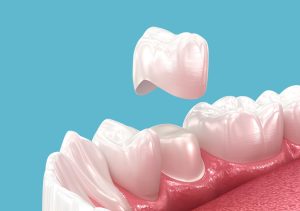Your Restorative Dentistry Questions Answered with Dr. Jay Ajmo
Dental professionals specializing in restorative dentistry are often asked, “Do I really need a dental crown?” It is one of the most common restorative treatments for people who have chipped or broken teeth. Along with this question comes another, “Do I have to undergo root canal treatment before getting dental crowns?” If you also have these queries in mind, then you’re reading the right blog post.
If you have additional questions or need dental care in Palm Beach Gardens, or the surrounding communities of Jupiter, West Palm Beach, and North Palm Beach, call now at 561-627-8666.

Dental Crowns and Root Canal Treatment in Palm Beach Gardens, FL
What Is a Dental Crown?
A dental crown is generally the finest option for extending the life of a tooth for years to come. This is primarily the reason why they are commonly recommended. There are, however, solutions for treating a tooth that can postpone the need for a crown. When a dentist proposes several crowns for the first time, you should be cautious.

You might have a cracked tooth if it hurts when you bite down. A cracked tooth is a significant issue that usually necessitates using a crown. Vertical fissures that extend to the gumline may entail the placement of a full-coverage crown. If the crack extends below the gumline, the tooth may need a root canal, crown lengthening, or extraction.
Before resorting to other dental solutions, your dentist will first check to see if the tooth is broken rather than “crazed.” Craze lines are fairly prevalent and have no negative consequences. It can be found on almost every adult back tooth. These are simply stress lines that do not always indicate the need for a dental crown.
Because craze lines do not affect the fundamental integrity of your tooth, you have a variety of alternatives for treating them. Teeth whitening is the least invasive of these options, as it can remove the stains from the crack and minimize its visibility dramatically.
However, craze lines with strong stains or that are particularly long imply a growing crack. To see the crack, ask your dentist to check it.
Are There Other Alternatives?
While a crown is one option, in some circumstances, there may be others. You can ask your dentist if you’re a good candidate for dental fillings. Keep in mind, however, that a filling does not eliminate the need for a crown in the future.
Furthermore, if a significant section of your tooth requires a filling, a crown is usually a better option because fillings do not provide the same level of protection as crowns. Moreover, a big filling can cause the tooth to crack, rendering it irreparable.
What Are the Consequences of Delaying?
Generally speaking, nothing is going to happen. But it’s always possible that the tooth will chip and will require a straightforward fix. In some circumstances, waiting may lead to a more serious dental treatment, such as a root canal.
Additionally, it’s also possible that the tooth will split, which will require tooth extraction or crown lengthening in the long run. Your dentist can discuss these issues with you.
Is Root Canal Mandatory?
Root canals are not required for the majority of dental crown treatments. It is not required if a tooth is not diseased or intensely irritated. Hence, if you allow a dentist to treat your teeth at the earliest time possible, you may not have to undergo a root canal.

Have Questions About Restorative Dentistry?
Before proposing a crown or set of crowns, we consider all choices and discuss them with you. At PGA Dentistry, we see you as a partner in maintaining your dental health, and we’ll take the time to thoroughly explain our treatment recommendations. We’re proud to serve patients throughout North Palm Beach, Jupiter, and West Palm Beach, our Palm Beach Gardens dental team is here to help you find the perfect dental solution. Call us today at 561-627-8666!
